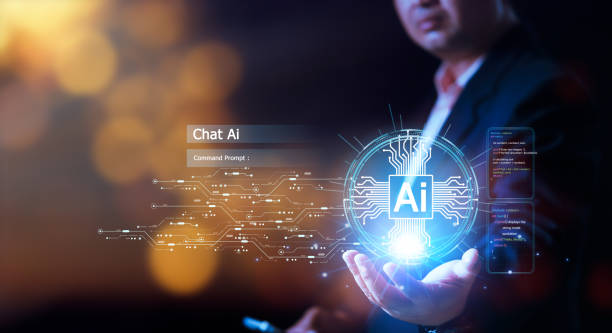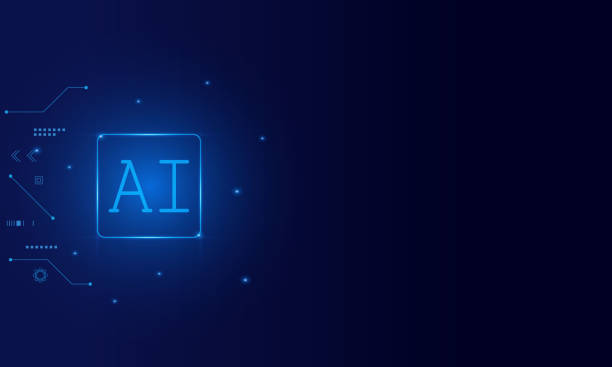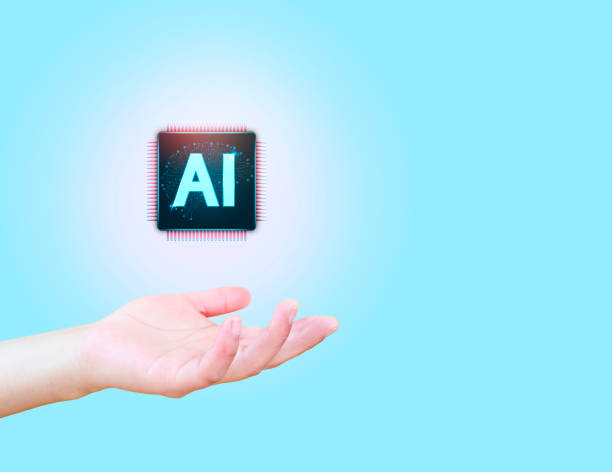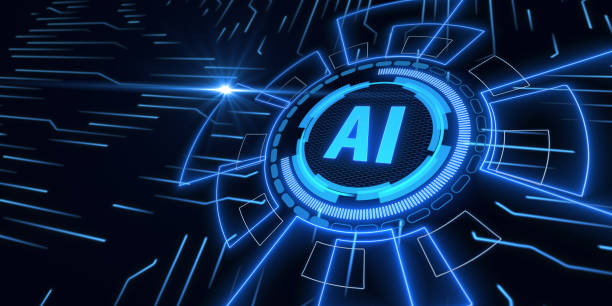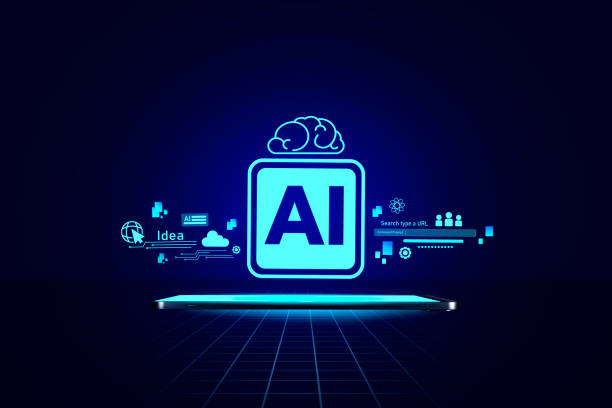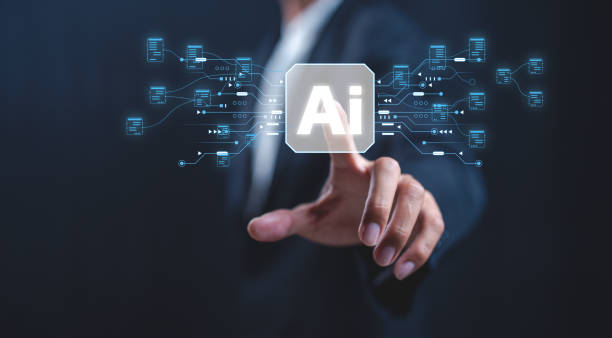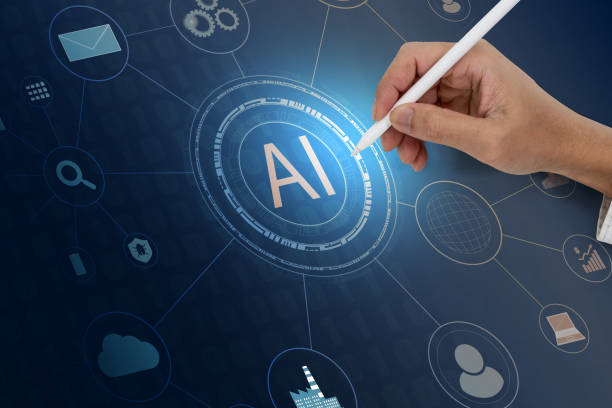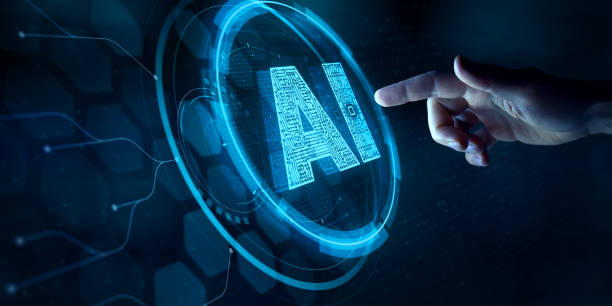What is Artificial Intelligence and How Is It Revolutionizing the World of Work?
Artificial Intelligence (#AI) is rapidly becoming an integral part of our daily lives.
From virtual assistants like Alexa and Siri to complex systems that control self-driving vehicles, AI is changing the way we live and work.
This technology not only automates processes but also creates new opportunities for innovation and productivity.
Its impact on the #future_of_work is extensive, and this article aims to explore various aspects of this impact.
Understanding the basic concepts of AI and its applications is key to comprehending these changes.
The career future of Artificial Intelligence will undergo fundamental transformations with the expansion of this technology’s applications.
In simple terms, Artificial Intelligence is the simulation of human intelligence processes in machines.
These processes include learning, reasoning, and problem-solving.
Using complex algorithms and vast amounts of data, AI can perform tasks that were previously only possible for humans.
For example, an AI system can recognize images, understand natural language, make financial decisions, and even create works of art.
These capabilities dramatically change the #career_future of Artificial Intelligence and create new opportunities and challenges for the workforce.
One of the most significant impacts of Artificial Intelligence on the world of work is the automation of repetitive and routine tasks.
This automation can lead to increased productivity and reduced costs, but at the same time, it raises concerns about job displacement.
However, AI can also create new jobs that require new and specialized skills.
The career future of Artificial Intelligence largely depends on how the workforce adapts to these changes.
Therefore, training and developing new skills are vital for success in this era.
Does your current corporate website not reflect your brand’s credibility and power as it should? Rasaweb solves this challenge for you with professional corporate website design.
✅ Increase visitor credibility and trust
✅ Targeted attraction of more customers
⚡ Click for a free consultation!
Which Jobs Will Be Most Affected by Artificial Intelligence?
The impact of Artificial Intelligence on different jobs will vary.
Some jobs will be fully automated, while others will need to change and adapt to new technologies.
Jobs involving repetitive tasks, extensive data processing, and simple decision-making are more susceptible to automation.
For example, professions such as data entry, simple accounting, telephone operation, and some manufacturing jobs are likely to be affected by automation.
However, this does not mean that these jobs will disappear entirely.
Instead, the nature of these jobs may change, requiring new skills.
Click here to preview your posts with PRO themes ››
On the other hand, jobs that require unique human skills, such as creativity, critical thinking, complex problem-solving, empathy, and emotional intelligence, are less susceptible to automation.
These professions include healthcare professionals, teachers, artists, scientists, managers, and entrepreneurs.
Artificial Intelligence can assist these individuals in their tasks, but it cannot replace them.
The career future of Artificial Intelligence indicates that jobs requiring a combination of technical and human skills will become more important.
Ultimately, it is important to remember that Artificial Intelligence is a tool, not a replacement for humans.
The goal of using AI is to increase productivity and improve the quality of life, not to eliminate jobs.
By training and developing new skills, one can benefit from the advantages of AI and mitigate its challenges.
The career future of Artificial Intelligence lies in the collaboration between humans and machines.
New Jobs That Artificial Intelligence Will Create
While some jobs may be lost due to automation, Artificial Intelligence also creates new employment opportunities.
These new jobs require specialized skills in various AI-related fields.
Some of these jobs include
AI and Machine Learning Engineers: These individuals are responsible for designing, developing, and implementing AI and machine learning systems.
They must have a deep understanding of algorithms, data, and programming.
The career future of Artificial Intelligence is very bright for these specialists, as the demand for them is rapidly increasing.
Data Scientists: Data scientists are responsible for collecting, analyzing, and interpreting data.
They use data to solve business problems, improve decision-making, and predict future trends.
This job requires strong statistical, programming, and communication skills.
The career future of Artificial Intelligence is highly dependent on data scientists, as data is the primary fuel for this technology.
AI Ethics Specialists: With the increasing use of Artificial Intelligence, concerns also arise regarding ethical issues such as discrimination, privacy, and accountability.
AI ethics specialists are responsible for ensuring that AI systems are designed and used fairly, transparently, and responsibly.
This job requires philosophical, legal, and technical knowledge.
The career future of Artificial Intelligence needs AI ethics specialists to ensure the responsible use of this technology.
Click here to preview your posts with PRO themes ››
AI Trainers: With the widespread use of Artificial Intelligence, the need for training and developing new skills in this field also increases.
AI trainers are responsible for educating individuals about AI concepts, tools, and techniques.
This job requires technical knowledge, communication skills, and the ability to convey complex concepts in simple terms.
The career future of Artificial Intelligence needs skilled trainers who can prepare the workforce for this new era.
| Job Title | Description | Required Skills |
|---|---|---|
| AI Engineer | Designing and developing AI systems | Machine Learning, Programming, Mathematics |
| Data Scientist | Analyzing and interpreting data | Statistics, Programming, Data Visualization |
| AI Ethics Specialist | Ensuring responsible use of AI | Philosophy, Law, Computer Science |
| AI Trainer | Teaching AI concepts and tools | Computer Science, Education, Communication |
Skills Required for Success in the Future World of Work with Artificial Intelligence
To succeed in the future world of work, which is increasingly influenced by Artificial Intelligence, it is necessary to develop new skills and adapt to new technologies.
Some of the most important required skills include
Technical Skills: Knowledge and proficiency in Artificial Intelligence, machine learning, data science, and programming will be essential for many jobs.
Even if you do not work directly in these fields, understanding basic concepts and the ability to work with AI-related tools can help you perform your tasks.
The career future of Artificial Intelligence requires specialists with a deep understanding of this technology.
Soft Skills: Soft skills such as critical thinking, complex problem-solving, creativity, communication, collaboration, and emotional intelligence will become increasingly important.
These skills help you confront complex issues, offer innovative solutions, communicate effectively with others, and adapt to changes.
The career future of Artificial Intelligence requires individuals who can use their intelligence and creativity to solve complex problems.
Continuous Learning: Given the rapid pace of technological advancement, continuous learning and skill updates are essential.
You must be prepared to learn new concepts, use new tools, and adapt to changes.
Participating in training courses, studying relevant articles and books, and attending conferences and seminars can help you in continuous learning.
The career future of Artificial Intelligence belongs to individuals who are constantly learning and progressing.
Specialized Skills: In addition to technical and soft skills, having specialized skills in your field of work is also very important.
You must have sufficient knowledge and experience in your area of work to effectively use Artificial Intelligence to improve performance and increase productivity.
The career future of Artificial Intelligence requires individuals who can combine their specialized knowledge with new technologies.
Did you know that your company’s website is the first point of contact for 75% of potential customers?
Your website is the face of your brand. With **Rasaweb**’s corporate website design services, create an online presence that earns customer trust.
✅ Create a professional and lasting image for your brand
✅ Attract target customers and increase online credibility
⚡ Get a free consultation from **Rasaweb** experts!
How to Prepare for a Career Future with Artificial Intelligence?
Preparing for a career future influenced by Artificial Intelligence requires careful planning, continuous learning, and adaptation to change.
Here are some strategies for preparing for this future:
Identify Required Skills: First, you need to identify the skills you will need to succeed in your desired job in the future.
Examine how Artificial Intelligence will impact this job and what new skills will be required.
By identifying these skills, you can begin planning their training and development.
The career future of Artificial Intelligence requires the identification and development of necessary skills.
Participate in Training Courses: Enrolling in training courses related to Artificial Intelligence, machine learning, data science, and programming can help you develop technical skills.
These courses can be held online or in-person and offered at various levels, from introductory to advanced.
The career future of Artificial Intelligence requires continuous training and the development of technical skills.
Develop Soft Skills: As mentioned, soft skills such as critical thinking, complex problem-solving, creativity, communication, and emotional intelligence will become increasingly important.
To develop these skills, you can participate in relevant training courses, study related books and articles, and engage in activities that require the use of these skills.
The career future of Artificial Intelligence requires the development of soft skills.
Networking: Connecting with people active in Artificial Intelligence and other related fields can help you learn, update information, and find job opportunities.
You can attend conferences and seminars, join relevant online groups, and connect with people of interest.
The career future of Artificial Intelligence requires networking and connecting with experts.
Embrace Change: The most important point is to embrace change and be ready to adapt to new technologies.
You must have an open mind and be prepared to learn new concepts and use new tools.
The career future of Artificial Intelligence requires embracing change and adapting to new technologies.
The Role of Government and Policymaking in the Career Future of Artificial Intelligence
Governments play a crucial role in shaping the career future influenced by Artificial Intelligence.
Appropriate policymaking can help mitigate the negative effects of automation, create new job opportunities, and ensure the fair and responsible use of AI.
Some important actions governments can take include
Investing in Education and Skill Development: Governments must make significant investments in education and skill development related to Artificial Intelligence and other new technologies.
This investment can include providing free training courses, supporting internship programs, and encouraging lifelong learning.
The career future of Artificial Intelligence requires investment in education and skill development.
Supporting Innovation and Entrepreneurship: Governments should support innovation and entrepreneurship in Artificial Intelligence and other new technologies.
This support can include providing financial incentives, tax reductions, and creating a suitable environment for startups.
The career future of Artificial Intelligence requires support for innovation and entrepreneurship.
Establishing Appropriate Regulations: Governments must develop appropriate regulations for the use of Artificial Intelligence to ensure fair, transparent, and responsible use of this technology.
These regulations should address issues such as privacy, discrimination, and accountability.
The career future of Artificial Intelligence requires establishing appropriate regulations.
Creating Support Networks: Governments can help individuals who have lost their jobs due to automation by creating support networks to learn new skills and find new employment.
These networks can include job centers, training programs, and career counseling.
The career future of Artificial Intelligence requires the creation of support networks.
International Cooperation: Artificial Intelligence is a global technology, and its impacts extend beyond national borders.
Therefore, international cooperation among governments for information exchange, policy coordination, and addressing common issues is essential.
The career future of Artificial Intelligence requires international cooperation.
Ethical and Social Challenges of Artificial Intelligence in the Workplace
The use of Artificial Intelligence in the workplace poses several ethical and social challenges that require attention and action.
Some of these challenges include
Discrimination: Artificial Intelligence algorithms can be inadvertently discriminatory, especially if trained on incomplete or biased data.
This discrimination can lead to unfair decisions regarding hiring, promotion, and other work-related issues.
The career future of Artificial Intelligence must prevent discrimination.
Privacy: The collection and use of personal data in the workplace can raise privacy concerns.
Employers must ensure that employees’ personal data is collected, used, and protected responsibly and in accordance with relevant laws and regulations.
The career future of Artificial Intelligence must preserve individual privacy.
Accountability: If an Artificial Intelligence system makes a mistake and causes damage, determining responsibility is difficult.
Should the system’s developer, the employer, or the system itself be held accountable? This issue requires careful examination and the formulation of relevant laws and regulations.
The career future of Artificial Intelligence must be accountable.
Transparency: Artificial Intelligence algorithms can be very complex, and understanding how they work can be challenging.
This lack of transparency can lead to distrust and concern about decisions made by AI systems.
The career future of Artificial Intelligence must be transparent.
Job Displacement: As mentioned, automation can lead to job displacement.
This issue can have negative impacts on the economy and society.
Governments and employers must take measures to mitigate these negative effects.
The career future of Artificial Intelligence must prevent a unemployment crisis.
The Career Future of Artificial Intelligence in Iran: Opportunities and Challenges
The career future of Artificial Intelligence in Iran, like in other parts of the world, faces numerous opportunities and challenges.
Iran has high potential for AI development, but to leverage this potential, existing challenges must be addressed.
Some of the opportunities and challenges of the #AI_career_future in Iran include
Opportunities: Iran has a young and educated workforce that can be active in the field of Artificial Intelligence.
Additionally, Iran possesses rich data resources that can be used to train AI systems.
Furthermore, the Iranian government pays special attention to AI development and implements various programs to support this technology.
The career future of Artificial Intelligence in Iran can be very bright if these opportunities are utilized correctly.
Challenges: One of the most important challenges for AI development in Iran is the lack of adequate infrastructure.
Iran needs more investment in information and communication technology infrastructure to support AI development.
Furthermore, Iran faces a shortage of specialized personnel in Artificial Intelligence.
To address this shortage, training and development of AI-related skills must be expanded.
Additionally, Iran faces legal and regulatory challenges in the field of Artificial Intelligence.
To resolve these challenges, appropriate laws and regulations for the use of AI must be formulated.
The career future of Artificial Intelligence in Iran faces challenges, but with proper planning, these challenges can be overcome.
| Opportunities | Challenges |
|---|---|
| Young and educated workforce | Lack of adequate infrastructure |
| Rich data resources | Shortage of specialized personnel |
| Government attention to AI development | Legal and regulatory challenges |
Is your e-commerce website ready to attract maximum customers and increase sales? Rasaweb transforms your online business with modern and efficient e-commerce website designs.
✅ Increase speed and improve SEO
✅ Excellent user experience on mobile and desktop⚡ Get a free e-commerce website design consultation from Rasaweb!
Probable Scenarios for the Career Future of Artificial Intelligence
The career future of Artificial Intelligence cannot be predicted with certainty, but various scenarios can be envisioned based on current trends and expert predictions.
Here are some probable scenarios for the #AI_career_future:
Scenario One: Human-Machine Collaboration: In this scenario, Artificial Intelligence acts as a tool to assist humans in performing their tasks.
AI automates repetitive and routine tasks, while humans focus on more complex and creative duties.
In this scenario, new jobs are created that require a combination of technical and human skills.
This is the most optimistic scenario and requires appropriate training and skill development.
The career future of Artificial Intelligence in this scenario necessitates human-machine collaboration.
Scenario Two: Extensive Automation: In this scenario, Artificial Intelligence is widely used for automating various tasks.
This automation leads to the loss of many jobs, especially those involving repetitive and routine tasks.
In this scenario, governments must take measures to support individuals who have lost their jobs and provide them with new training opportunities.
This is the most pessimistic scenario and requires appropriate policymaking.
The career future of Artificial Intelligence in this scenario faces serious challenges.
Scenario Three: Job Restructuring: In this scenario, Artificial Intelligence leads to a restructuring of jobs.
Some jobs are entirely eliminated, others require change and adaptation, and some are entirely new.
In this scenario, individuals must be prepared to learn new skills and adapt to changes.
This is the most probable scenario and requires flexibility and continuous learning.
The career future of Artificial Intelligence in this scenario requires change and adaptation.
Recommendations for Graduates and Students Regarding the Career Future of Artificial Intelligence
The career future of Artificial Intelligence creates many opportunities for graduates and students.
To utilize these opportunities, you must plan for your future now and develop the necessary skills.
Here are some recommendations for graduates and students:
Choose a Suitable Field of Study: If you are interested in working in Artificial Intelligence, choose relevant fields of study such as computer science, electrical engineering, mathematics, and statistics.
In these fields, you will learn the basic concepts of AI, machine learning, and data science.
The career future of Artificial Intelligence requires choosing a suitable field of study.
Develop Technical Skills: Throughout your studies, try to develop your technical skills in programming, statistics, machine learning, and Artificial Intelligence.
Participating in training courses, working on practical projects, and studying scientific articles can help you develop these skills.
The career future of Artificial Intelligence requires the development of technical skills.
Develop Soft Skills: As mentioned, soft skills such as critical thinking, complex problem-solving, creativity, communication, and emotional intelligence will become increasingly important.
To develop these skills, you can participate in relevant training courses, study related books and articles, and engage in activities that require the use of these skills.
The career future of Artificial Intelligence requires the development of soft skills.
Networking: Connect with people active in Artificial Intelligence and other related fields.
Attend conferences and seminars, join relevant online groups, and connect with people of interest.
Networking can help you learn, update information, and find job opportunities.
The career future of Artificial Intelligence requires networking.
Continuous Learning: Given the rapid pace of technological advancement, continuous learning and skill updates are essential.
You must be prepared to learn new concepts, use new tools, and adapt to changes.
Participating in training courses, studying relevant articles and books, and attending conferences and seminars can help you in continuous learning.
The career future of Artificial Intelligence requires continuous learning.
Frequently Asked Questions
| Question | Answer |
|---|---|
| How will Artificial Intelligence impact the future job market? | Artificial Intelligence will automate repetitive jobs, but at the same time, it will create new and more complex jobs in areas such as development, maintenance, and training of AI systems. |
| Which jobs are most at risk of being replaced by Artificial Intelligence? | Jobs involving repetitive, rule-based tasks with low need for creativity or emotional intelligence, such as some manufacturing jobs, data entry, and simple customer service, are most at risk. |
| What skills are essential for success in a future career with Artificial Intelligence? | Skills such as critical thinking, complex problem-solving, creativity, emotional intelligence, data literacy, the ability to work with AI, and lifelong learning are of high importance. |
| Will Artificial Intelligence lead to widespread unemployment? | Some jobs will be lost, but history has shown that new technologies, instead of causing widespread unemployment, transform the job market and create new jobs. The need for adaptation and retraining is crucial. |
| What new job opportunities emerge with the advent of Artificial Intelligence? | Jobs such as Machine Learning Engineer, Data Scientist, AI Ethicist, Human-AI Interaction Designer, and Digital Transformation Consultant are among the new opportunities. |
| What is the role of education in preparing for a career future with Artificial Intelligence? | Education should focus on developing soft skills, computational thinking, digital literacy, and the ability for continuous learning to prepare individuals for future changes. |
| How can I prepare myself for the job market changes caused by Artificial Intelligence? | You can prepare yourself by learning new skills related to AI and data, strengthening soft skills, developing critical thinking and creativity, and adopting lifelong learning. |
| Will AI ethics become an important career field? | Yes, given the increasing concerns about biases, privacy, and automated decision-making by AI, the role of AI ethics specialists will become crucial to ensure its responsible development. |
| What is the importance of human-AI collaboration in the career future? | Human-AI collaboration, rather than competition, will shape the future job market. AI can be a tool to increase productivity and allow humans to focus on more complex and creative tasks. |
| Which industries will be most affected by Artificial Intelligence? | Almost all industries will be affected, but areas such as healthcare, finance, transportation, manufacturing, education, and customer services are pioneers in adopting and transforming through AI. |
And other advertising agency services by Rasaweb in the field of advertising:
Smart UI/UX: A new service to increase online growth through SEO-driven content strategy.
Smart Link Building: An effective tool to boost sales by optimizing key pages.
Smart Advertorials: A creative platform to improve customer acquisition with marketing automation.
Smart Customer Journey Map: A dedicated service for increasing website traffic growth based on intelligent data analysis.
Smart UI/UX: Professional optimization for digital branding using key page optimization.
And over hundreds of other services in internet advertising, advertising consultation, and organizational solutions.
Internet Advertising | Advertising Strategy | Advertorials
Sources
The Career Future of Artificial Intelligence: Opportunities and Threats
Employment Challenges in the Era of Artificial Intelligence
Job Market Outlook with the Emergence of Artificial Intelligence
The Impact of Artificial Intelligence on Jobs and the Future of Work
? With Rasaweb Afarin, your business shines in the digital world! With our expertise in key areas of digital marketing, including multilingual website design, search engine optimization (SEO), and professional social media management, we are ready to elevate your brand to its peak.
📍 Tehran, Mirdamad Street, next to Bank Markazi, Southern Kazeroun Alley, Ramin Alley, No. 6

